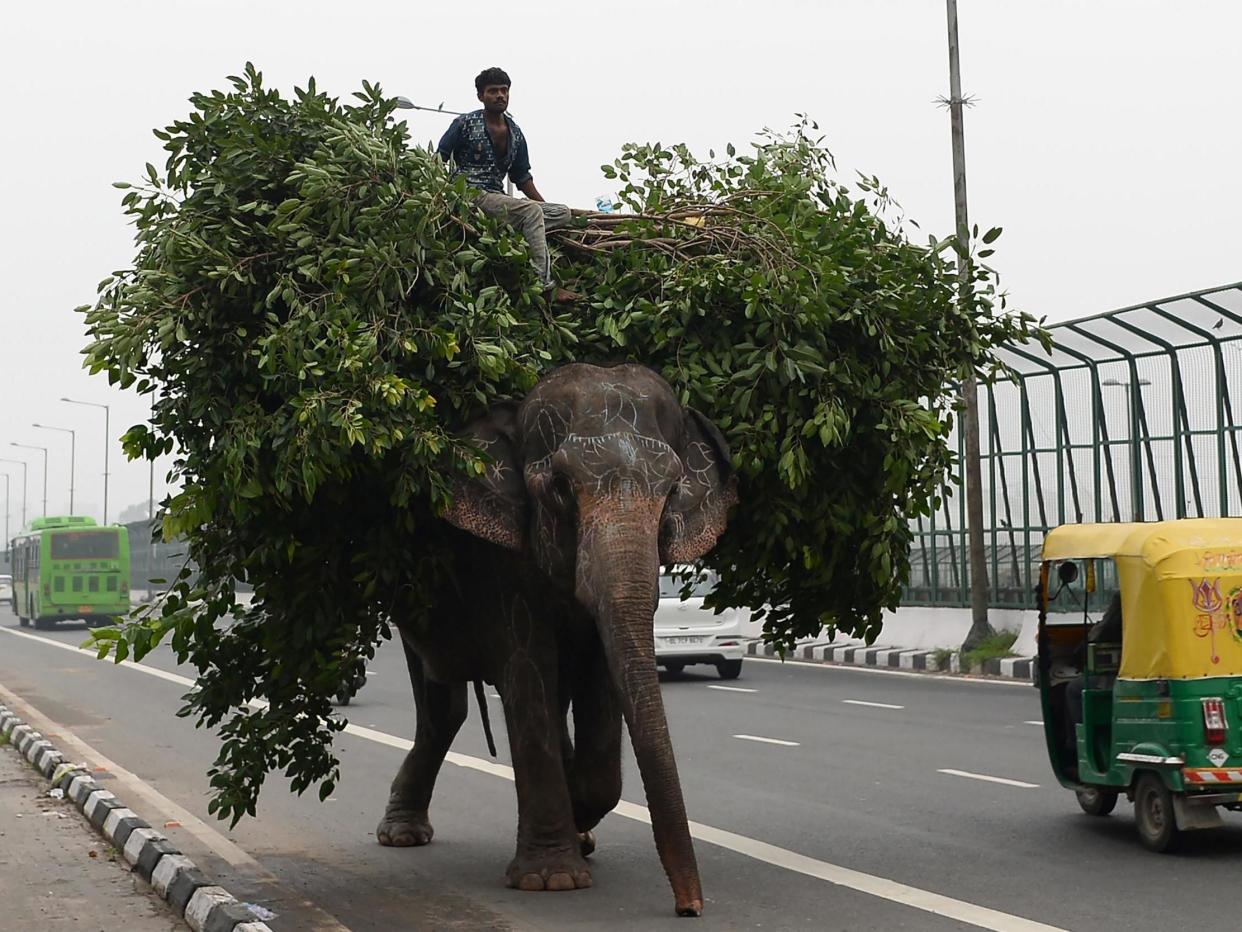Last elephant owner in Delhi hiding in city forest to evade police

The case of the last elephant in Delhi, missing for more than two months, has taken a bizarre twist after its owner admitted she had in fact never left the Indian capital.
Yusuf Ali, 45, is wanted by the police for preventing forest officials from confiscating his 35-year-old female elephant Lakshmi and absconding with her into the forest.
After a three-hour chase, Mr Ali, his two sons and Lakshmi evaded capture by wading across the Yamuna river, and the pair had not been located or heard from since.
The Delhi government informed neighbouring states after the incident on 6 July, and in August issued a nationwide alert to all Indian forest departments to be on the lookout for any trafficked elephants matching Lakshmi’s description.
But now, Mr Ali has given a newspaper interview from his apartment hideout in which he says the elephant is still being cared for by the family in a “large farmhouse” at an unidentified location to the east of the city, and has never left the greater Delhi region.
Read more
Elephants poked with pointed sticks for UK tourists at Indian resort
Mr Ali said he had moved from house to house, staying with relatives, and repeatedly changed phones to avoid capture, but that he was now willing to let the courts decide Lakshmi’s future and accept their ruling.
“It has been a very difficult time,” he told the Indian Express. “This is my elephant, and I have an emotional attachment with it. If [the ruling] goes in the wildlife department’s favour then I would have to give back the elephant. Until then, it is mine and maybe the court will hear my defence and understand it.”
India has approximately 3,500 elephants living in captivity, of which up until 2016 just seven were registered to owners in Delhi.
After a committee found that conditions in the capital were not suitable for keeping elephants, the Delhi High Court ruled that all seven should be seized and relocated to specialist sanctuaries.
Three years of appeals and court appearances followed, until July this year when every elephant except for Lakshmi had been rehomed - the majority to the neighbouring state of Haryana.
The forest department says that when officials went to Mr Ali’s home on 6 July to seize Lakshmi, his family resisted and assaulted the officers before some of them fled with the animal.
The warrant for Mr Ali’s arrest says that he is wanted for “assault or criminal force to deter a public servant from discharge of his duty”, and that he may not apply for bail.
In his newspaper interview, Mr Ali alleged that he had arrived home to find his wife had been assaulted by the forestry officials, and he and his son only acted to intervene before taking Lakshmi away. The forest department denied this description of events.
Mr Ali’s youngest son Shajib, in a separate interview with the Hindustan Times, insisted that his father and his older brothers were taking good care of the animal. “We too have got attached to Lakshmi during all these years, and don’t want the police or the forest department to take it away,” he said.
On the face of it, hiding a fully grown Indian elephant from the police in a capital city might seem a challenge. Mr Ali described the difficulties of acquiring a 500-litre tanker of water each day, plus large amounts of sugar cane and sorghum (a local cereal crop).
But the city is bounded by large protected forests, particularly to the west and to the east around the Yamuna river, and as a state had more than 20 per cent forest cover in 2017, the most recently available data.
Delhi Police insisted that a “dedicated team” was involved in the search. Deputy commissioner of police (East) Jasmeet Singh told the Express: “There is no update on the elephant case at present.”
For animal rights activists, the sooner Lakshmi can be recovered from Mr Ali and sent for specialist care, the better. They say that before she was approved for transfer to Haryana’s Ban Santour facility, the elephant was diagnosed with herpes, and requires treatment.
Kartick Satyanarayan, the charity’s chief executive and co-founder, told The Independent that Delhi’s captive elephants were living in “horrific conditions” on the banks of the polluted Yamuna, and being overworked at social occasions and festivals across the city, as well as suffering from malnutrition. “An elephant in captivity suffers endlessly and this was no different for Delhi's captive elephants,” he said. Elephants are a national icon in India and a Schedule 1 animal in the 1972 Wildlife Protection Act – meaning those who abuse them can face up to seven years in prison. They number only around 22,000 in the wild, and the capture of wild elephants or breeding of the animals for captivity is illegal. But thousands of existing captive elephants live in a legal grey area. Licences to keep them can be obtained from a state’s chief wildlife warden, and in 2016 the Supreme Court observed that the animals could be kept as long as owners are not “unkind to elephants”. Read more Elephants poked with pointed sticks for UK tourists at Indian resort Panicked elephants trample crowds at religious parade in Sri Lanka Attempts to reopen global elephant ivory trade fail EU set to overturn ban on baby elephants being sent to foreign zoos

 Yahoo News
Yahoo News 

